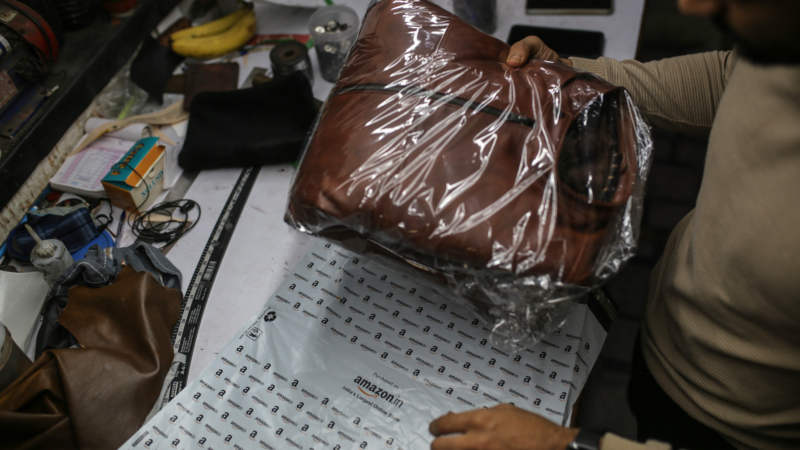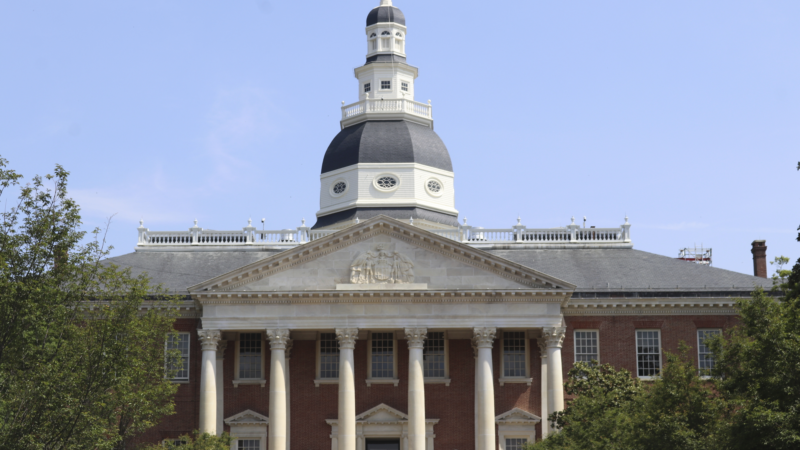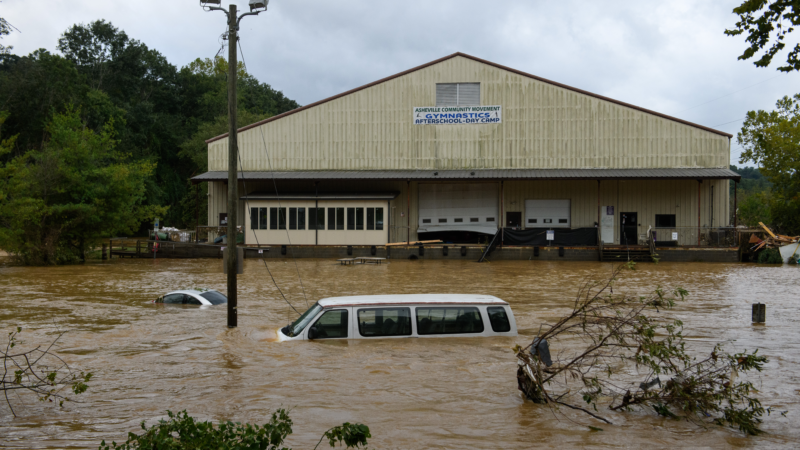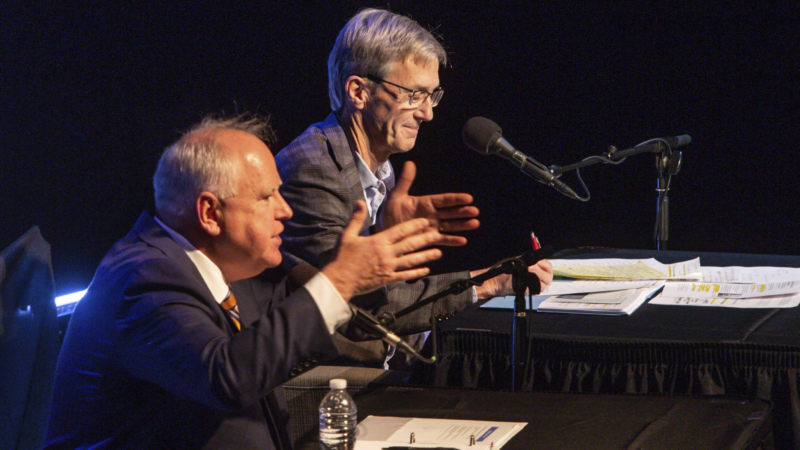Amazon India workers say they’re overworked and mistreated during a brutal heat wave
MANESAR, India — Between April and June, a deadly heat wave struck large swaths of northern India. Birds dropped dead from the sky. Demand for electricity skyrocketed. Forest fires raged in the Himalayas.
And at an Amazon facility on the outskirts of the capital New Delhi, in the dusty industrial town of Manesar, Rajesh Singh remembers his colleagues at the loading dock fainting around him.
“It happened so frequently, I thought there was a virus doing rounds,” Singh says.
Singh, 24, and a handful of his colleagues met NPR reporters at a roadside café in mid-June, giving up the chance to make a day’s overtime pay of the equivalent of around $14. It beefs up his earnings that come to around $120 a month. The pay might be decent in a village or provincial town, but it’s low for these parts around Delhi.
Singh says he largely likes his job, its flexible hours and his colleagues. That’s echoed by the dozen other people NPR spoke to. Most of them handle storing, packaging and shipping work in Amazon warehouses based in the outskirts of New Delhi and Mumbai.
But Singh and his colleagues say they were speaking out because they want Amazon to treat workers better.
In a statement sent by email, Amazon says the company complies with Indian law, and there’s “nothing more important than the safety and wellbeing of the workers.” The statement adds that Amazon keeps all their facilities cool, managers can temporarily suspend work if it gets too hot, and Amazon “ensures additional breaks when temperatures are high.” Amazon says it curtails deliveries during the hottest parts of the day during the heat wave.
Singh and his colleagues say this never happened, even during the worst spells of the heat wave. “We had to work from the minute we sign in to the minute we stop for a break,” says Neha, another worker at the Amazon facility in Manesar.

Workers are entitled to two 30-minute breaks during their eight-hour shift. The rest of the time, says Neha, managers expect them to power through the day — calling it a “fast start” and a “strong finish” — even if a worker feels any discomfort or illness.
Neha wants to only use her first name, fearing retaliation from her managers. Most other Amazon workers NPR spoke to requested similar anonymity.
They told NPR that the busiest periods are while processing orders for subscribers of Amazon’s same-day delivery service. Neha says that’s when their bosses pressure them not to use toilets or take a water break.
In June, India’s semi-governmental National Human Rights Commission sent a notice to the company after the Indian Express newspaper reported that workers at an Amazon warehouse were made to pledge not to take toilet or water breaks until they’d met their targets for the day. In Amazon’s emailed statement to NPR, it called this an “isolated incident of poor judgment” and said it had taken disciplinary action against the person responsible.
Senior Amazon India management, who spoke to NPR on condition of anonymity because they were not speaking as individuals, but to represent the company, told NPR that workers can use a restroom whenever they need to. They said they had not received any complaints surrounding workers being pressured to not use the toilet, despite having what they say is a robust and anonymized complaints system.
In its emailed statement to NPR, Amazon said, “We have multiple toilets and washrooms at our facilities that employees and associates can use whenever they need.”
And yet nearly every Amazon worker who spoke to NPR said they were pressured not to use the toilet during the busiest periods of the day.
That is also true hundreds of miles away, on the outskirts of the port city of Mumbai. There, a 25-year-old worker at an Amazon facility in Bhiwandi town recalls his manager berating him for taking a toilet break without permission. The worker, who requested anonymity to speak freely, says his manager accused him of wasting time — or having an undeclared medical problem. When he argued with his manager, he says, he got a formal warning for misbehavior.
To avoid confrontations such as this, another Amazon worker, 31, says he avoids drinking water on the job. He also takes medication for back pain, chest pain and blood pressure, which he says is up. He blames this on not getting to rest enough on the job. He says he’s lost more than 30 pounds since he began working at Amazon four years ago, “and I’ve been taking medicine every day.”
Amazon workers who spoke to NPR joke that the toilets do have one function in their workplace — as a break room. Like when Rajesh Singh, from the Amazon facility on the outskirts of New Delhi, says he hurt his finger in a conveyor belt. He tells NPR that a human resources officer told him to just use his other hand. Singh says he made a fuss, and was finally told to take a break in the restroom.
In their statement, Amazon senior management did not respond to NPR’s questions about the specific workplace injuries NPR described to them. The workers NPR spoke to say they don’t feel safe airing these complaints formally, particularly about workplace injuries. They’re afraid they’ll be or denied overtime by their direct managers — or fired.
“Some bosses tell us to quit if we can’t take it,” says the 25-year-old man who works in the Amazon facility on the outskirts of Mumbai. “That there are hundreds willing to take our place.”
In August, Amazon’s India management invited NPR to tour the company’s busiest facility in India on the outskirts of New Delhi. It’s a three-story warehouse spread over acres. During the escorted tour, NPR saw employees working with their heads down, rapidly picking products off shelves, sorting them into orders, packing them into boxes and slapping addresses on them. There was a cafeteria with meals at affordable prices.
There were three workers in a first aid room that was clean and bright. Amazon tells NPR that their medical facilities go beyond what’s required by Indian law.
After the tour, Amazon management answered questions by NPR reporters. They mostly echoed the emailed statement, but one senior official added he believed the claims that workers made to NPR were false — and politically motivated.
The official didn’t clarify what he meant but alluded to a recent report by a global union that alleged mistreatment in Amazon facilities. The report by the UNI Global Union organization in Switzerland last year detailed problems facing Amazon workers around the world, like being underpaid and having to urinate inside bottles to meet productivity targets.

Indian employees who spoke with NPR said they weren’t aware of that report. But some did say they were inspired by workers in Staten Island, N.Y., who made history in 2022 as the first, and so far only, unionized Amazon warehouse.
The Indian workers are supported by lawyer Dharmendra Kumar, a labor rights activist. He helped found the Amazon India Workers Association. Kumar says even though Amazon isn’t the biggest e-commerce platform in India, it’s the global standard bearer. “Amazon is the leader here,” he says. “If the leader changes, others will follow.”
Kumar says the stakes are high: The country’s e-commerce market will only get bigger, and he wants workers to be treated better from the beginning.
After similar reports in local media in June, India’s National Human Rights Commission asked the Labor Ministry to investigate Amazon worker complaints. Amit Basole, professor of economics at India’s Azim Premji University, says he’s doubtful much will happen, because the government’s priority is to create jobs for the country’s enormous young, underemployed population.
“[Labor rights] protection is important but the first thing is to create enough jobs,” he says.
Back in the roadside cafe, Rajesh Singh says workers at Amazon in India deserve better.
“Do you know what happens when you click to order a mobile phone off Amazon?” he asks. “How many people might fall sick in fulfilling your order? What abuse will they be exposed to? How many workers get blacklisted during that process?”
He says, “You don’t know. You just order.”
Editor’s note: Amazon is among NPR’s financial supporters and pays to distribute some NPR content. NPR covers the company independently.
Transcript:
MICHEL MARTIN, HOST:
Listen to this advertisement. It’s in Hindi, one of India’s main languages.
(SOUNDBITE OF ARCHIVED RECORDING)
UNIDENTIFIED PERSON #1: (Speaking Hindi).
MARTIN: Sound familiar? It’s for Amazon. What might also sound familiar are the grievances of some workers in Amazon’s fulfillment centers in India. And we want to note here that Amazon is among NPR’s financial supporters and pays to distribute some of our content, but we cover the company the same way we cover any other company or group, and that’s independently. NPR’s Diaa Hadid reports from the outskirts of the capital, New Delhi.
DIAA HADID, BYLINE: At a roadside cafe, 24-year-old Rajesh Singh tells us what it was like to work at a loading dock at an Amazon facility during the recent heat waves. That heat wave in northern India lasted till late June. Temperatures hovered in the triple digits for weeks.
RAJESH SINGH: (Non-English language spoken).
HADID: He says people were fainting all around me. To speak to NPR, Singh gives up his chance to work a day’s overtime, worth about $14. It beefs up his monthly earnings of around $120 a month. The pay might be decent in a village or provincial town, but it’s low for these parts around Delhi. Singh says he’s speaking out because he wants Amazon to treat workers better. To be clear, Singh largely likes his job – the flexibility, his colleagues. And that’s echoed by the dozen other people we interview. They work in Amazon facilities outside New Delhi, and on the outskirts of Mumbai.
In a statement sent to NPR attributed to a spokesperson, Amazon says it complies with Indian law. It says, there’s nothing more important than worker safety. Senior Amazon management echoed that at a recent tour of a facility. But Singh says during the heat wave, in the loading areas where the trucks come and go. It was hell.
SINGH: (Non-English language spoken).
HADID: He says his female coworkers often fainted or felt dizzy. Still, they were expected to fulfill their loading targets, including lifting heavy items. Other workers tell a similar story. Amazon says all their facilities are kept cool, and managers can suspend work if it gets too hot, which they say has never happened. Amazon says they also curtail deliveries during the hottest parts of the day during the heat wave.
Heat or no, workers describe a relentless pace. One woman, Neha, tells us they have to work from the minute they sign in to the minute before they stop for a break, and then from the minute their break ends.
NEHA: (Non-English language spoken).
HADID: She says it’s called a fast start and a strong finish. She asks we don’t use her name, so she doesn’t risk her job. Most workers we interview request the same. Nearly all the workers say they’re pressured not to use the bathroom when they’re delivering same-day orders. It’s the busiest period. Amazon says workers may use washrooms whenever they need to go. The workers joke, the toilets do have one key job – as a restroom. Like when Rajesh Singh says he crushed his finger in a conveyor belt – he says a human resources officer told him to just use his other hand.
SINGH: (Non-English language spoken).
HADID: Singh loads delivery trucks – not a one-handed job. He made a fuss and says he was finally told he could rest in the restroom. Amazon tells NPR that their medical facilities go beyond what’s required by Indian law. On a recent tour of a facility, we saw three workers in a first aid room that was clean and bright. But hundreds of miles away, two workers on the outskirts of Mumbai echo the grievances made on the outskirts of New Delhi. They chat at a noisy bus station.
UNIDENTIFIED PERSON #2: (Non-English language spoken).
UNIDENTIFIED PERSON #3: (Non-English language spoken).
HADID: One 25-year-old worker says he doesn’t go to the bathroom for hours to keep up with his quotas.
UNIDENTIFIED PERSON #2: (Non-English language spoken).
HADID: He says he takes pills for back pain, chest pain, and his blood pressure, which he says is up because he doesn’t get to drink water or rest enough on the job. Amazon senior management says they have robust anonymous reporting systems for workers to air grievances. They say no one has reported anything like this. The workers we spoke to say they don’t feel safe airing these complaints. They’re afraid they’ll be denied overtime by their direct managers. They say they fear they’ll be blacklisted, fired, if they report being sick or injured at work. Amazon management invite us to the company’s busiest facility on New Delhi’s outskirts.
UNIDENTIFIED PERSON #4: Welcome to Amazon, India’s most…
HADID: They ask us to switch off our recorders while we tour.
We’ve just left the Amazon facility now. It’s really acres and acres of sprawling warehouse space. It’s about three stories high. Most of the workers that we saw – they’re young, they’re thin – heads down and getting on with their jobs.
Workers rapidly pick products off the shelf, sort it into orders, pack it into boxes, slap addresses on it. There’s a cafeteria with meals at cheap prices so workers can afford them. After our tour, NPR producer Omkar Khandekar and I asked the management questions. They speak on condition of anonymity because they’re representing the company, not themselves. They mostly echo the statement given by the Amazon spokesperson. But one senior official adds, he believes the claims that workers made to NPR are false and politically motivated. He says they echo complaints from a global union report that detailed problems facing Amazon workers around the world. Workers we spoke to weren’t aware of that report, but they say they are inspired by efforts to unionize elsewhere. They’re specifically talking about the U.S., where workers on Staten Island made history as the first and only unionized Amazon warehouse.
(CHEERING)
HADID: Lawyer Dharmendra Kumar helped form the Amazon India Workers Association. He says, even though Amazon isn’t the biggest e-commerce platform in India, it’s the global standard bearer.
DHARMENDRA KUMAR: Amazon is a leader here. If the leader changes, others will follow.
HADID: Is that why Amazon is the target presently?
KUMAR: Yeah.
HADID: Kumar says the stakes are high. India is the world’s most populous country, but there’s not many jobs for young people. The e-commerce market will only get bigger. He wants workers to be treated better from the get-go. After similar allegations were aired in local media, the labor minister was ordered to investigate allegations. Back in the roadside cafe, Rajesh Singh says workers deserve better. He says, do you know what happens when you click to order off Amazon?
SINGH: (Non-English language spoken).
HADID: How many people might get sick? What abuse they might be exposed to? How they might get blacklisted? He says, you don’t know. You just order.
Diaa Hadid, NPR News, New Delhi.
Historic flooding strands hundreds in North Carolina. And, Hezbollah leader mourned
Tropical storm Helene has left western North Carolina with catastrophic damage from historic flooding to a loss of power for thousands. And, Lebanon mourning the loss of Hezbollah leader.
Maryland seemed poised this year to legalize medical aid in dying. What happened?
Most Americans support allowing some terminally ill patients to end their own lives. But a Maryland bill’s narrow defeat shows the issue is still religiously fraught and politically delicate.
Helene death toll rises to over 90 as millions remain without power
At least 91 people across several states were killed. Officials warned that rebuilding from the widespread loss of homes and property would be lengthy and difficult.
An NPR investigation: A murder in Hebron
Was the murder of a young Palestinian man in the West Bank an anti-gay hate crime? NPR identifies the accused killer and explores the parallel systems of justice that have yet to resolve this case.
Vance and Walz debate in New York City on Tuesday. Here’s what you need to know
The CBS News vice presidential debate will be the only time Ohio Sen. JD Vance and Minnesota Gov. Tim Walz get to face off ahead of the 2024 election. Here's what to expect.
What Tim Walz’s past debate performances reveal about how he may take on JD Vance
Those who’ve debated Walz before say he has a down-to-earth style that is relatable to voters — but it's an approach that can also cause problems for the Democratic vice presidential nominee.






